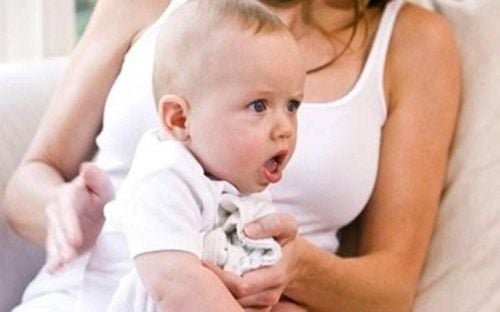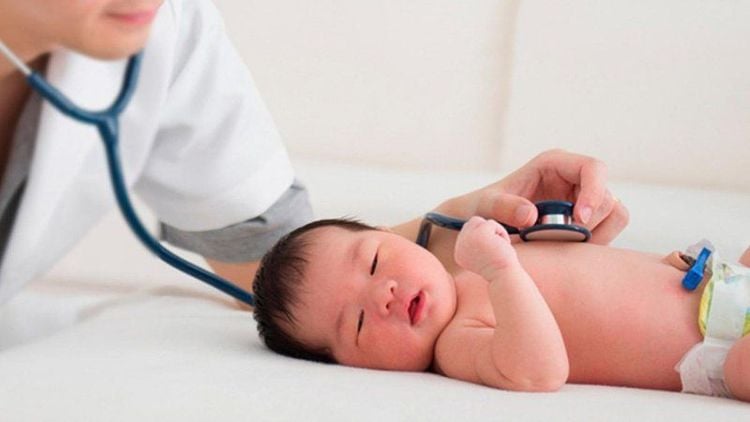This is an automatically translated article.
The article is professionally consulted by Resident Doctor of Pediatrics - Neonatology - Department of Pediatrics - Neonatology - Vinmec Hai Phong International General Hospital.
Bronchopneumonia or pneumonia in children is a common respiratory infection, the main cause of hospitalization due to serious complications, even death. Parents need to know the symptoms of bronchopneumonia in young children to have the right attitude to deal with the child as soon as possible.
1. Signs of bronchopneumonia in children
Bronchitis in children is a lung infection, when the air sacs inside the lungs, or alveoli, contain a lot of pus and other fluids, making it difficult for the lungs to exchange gases. Respiratory problems are severely affected. Symptoms and signs of bronchopneumonia range from mild to severe. Depending on the condition and condition of each child, a child with bronchopneumonia will have typical signs such as:
Rapid breathing: We can count the child's breathing for a full minute to see if the child is breathing fast. or not. It is called tachypnea when: + Breathing rate is 60 times/minute or more in children under 2 months.
+ From 50 times / 1 minute or more in children from 2 to 11 months.
+ From 40 times / 1 minute or more children from 12 months to 5 years old.
Wheezing. Breathe in the chest. Cough. High fever or low temperature. Stuffy nose. Chilled feeling. Vomiting, nausea. Chest pain. Stomachache. Children are inactive, lazy, even lethargic, difficult to wake up. Children lose appetite, eat poorly, become dehydrated. There are purple lips, fingernails, and feet. When a child has symptoms of pneumonia, it should be taken to a medical facility for examination and treatment immediately.
Trắc nghiệm: Nhận biết sớm dấu hiệu chậm phát triển thể chất và trí tuệ ở trẻ
Nếu 6 tuổi không biết đếm số, 7 tuổi vẫn chưa phân biệt được giữa thực tế và tưởng tượng thì có thể bé chậm phát triển thể chất và trí tuệ hơn so với bạn bè cùng lứa. Bạn đã nhận biết được các dấu hiệu bất thường sớm này chưa? Cùng làm nhanh bài trắc nghiệm sau để trang bị thêm kiến thức cho mình nhé!
The following content is prepared under supervision of Thạc sĩ, Bác sĩ y khoa, Ma Văn Thấm , Nhi , Phòng khám Đa khoa Quốc tế Vinmec Dương Đông(Phú Quốc)
2. How to take care and prevent children from bronchopneumonia?
Children with bronchopneumonia need proper care and disease prevention for children as follows:
Need to ensure enough nutrition for children, give them enough water to drink. Babies should be exclusively breastfed for the first 6 months after birth. Supplement vitamin D, zinc. Make sure your child's place is cool and hygienic. Keeping children's living environment free of smoke and dust. Complete and on-time immunizations. Regularly clean the nose and throat with physiological saline. Keep warm in winter, when it gets cold. Handwashing. Early detection and definitive treatment of acute and chronic respiratory diseases. Know when to take your child for a follow-up visit: Follow-up appointment after 2 days to assess whether the treatment is good or not or re-examine immediately if the child has 1 of the following signs: Difficulty breathing (rapid breathing) breathing, chest constriction), the child cannot drink water, the child becomes more tired. Avoid contact with people with acute respiratory infections.

3. How to treat bronchopneumonia?
Bronchopneumonia in children depends on the cause, symptoms of the disease, severity or mild, the doctor will have appropriate treatment directions. In mild cases of bronchopneumonia without complications, parents can completely take care of themselves at home under the advice of a doctor. Accordingly, parents need to give their children a nutritious diet and give them plenty of water to drink to avoid dehydration. Parents need to clear the nose for children by instilling 2-3 drops of physiological saline, using according to the instructions of the doctor. In particular, it is necessary to avoid children's exposure to tobacco smoke and dust to limit aggravation of the disease.

Note when children have the following signs, they need to go to the hospital:
High fever or low temperature. Poor suckling, not eating. Stridor, wheezing, or stopped breathing in an infant. Lethargy, cyanosis, fussiness, even convulsions, etc. Bronchopneumonia in young children cannot be subjective in prevention and treatment when there are symptoms. Parents need to pay attention to their children's expressions to grasp specific health conditions to know how to cope. When you cannot take care of your child at home, you should take your child to the hospital to receive advice, examination and treatment orientation from a specialist.
Children at any stage are very susceptible to pneumonia. Therefore, parents should add some supporting foods containing lysine ingredients, essential micro-minerals and vitamins such as zinc, chromium, selenium, B vitamins,... to help fully meet their needs. nutrients, while supporting the immune system, enhancing resistance, reducing the risk of upper respiratory tract infections, bronchitis, pneumonia, and flu in children.
Please regularly visit Vinmec.com website and update useful information to take care of your baby and family.








